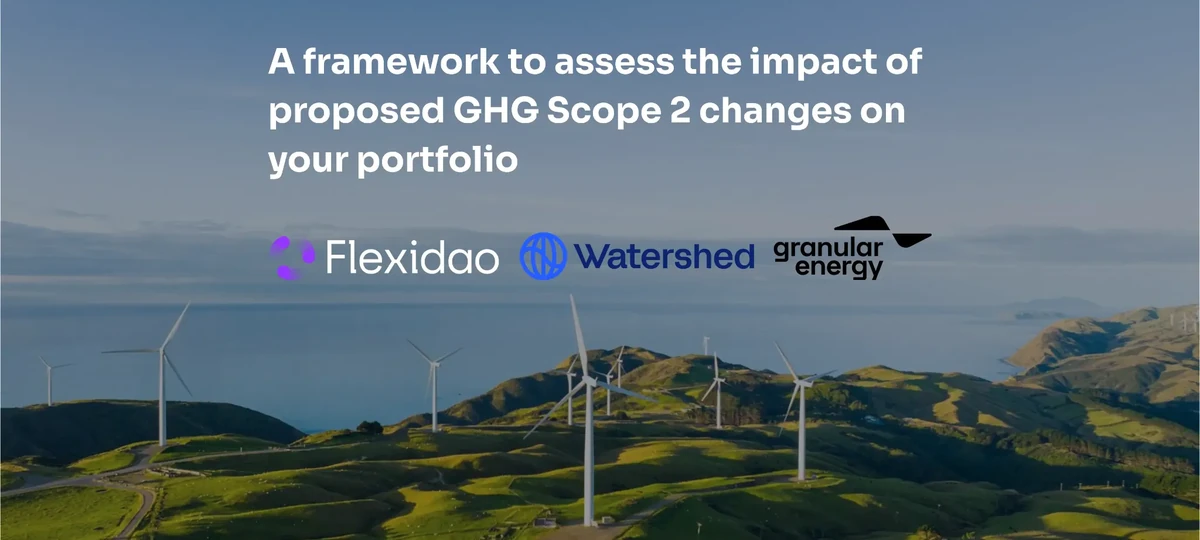Hourly Energy Accounting at Scale
Hourly Energy Accounting at Scale
Our recent work with Google demonstrates that hourly energy certification is feasible at scale and ready to support corporate clean energy goals.
A recent pilot project, led by Flexidao and Google, showcases a working solution that demonstrates the global feasibility of hourly energy accounting backed by hourly certificates.
This summer, Flexidao has successfully converted a global portfolio of energy purchases into hourly certificates. Using the EnergyTag Granular Certificate Scheme Standard, the demonstration proved that a robust, auditable system for hourly energy accounting is ready at scale and can be applied in line with emerging standards and regulatory requirements.
Validated by Global Standards
Our work is built on a foundation of global standards and third-party validation. Flexidao is an officially accredited platform by EnergyTag, the leading independent, non-profit organization setting the standards for granular energy certificates. Our platform has undergone a rigorous third-party validation process to ensure our methodology is robust, auditable, and fully compliant with the Granular Certificate Scheme Standard1.
Proof of Concept at a Global Scale
Flexidao converted Google’s portfolio of energy certificates into hourly format, retiring granular certificates for over 100 sites, representing 10.5 TWh of energy across 7 countries. The effort required ingesting and cleaning over 1 million datapoints from asset operators across different geographies, and successfully demonstrated hourly electricity inventory accounting at scale.
The "Configuration 3" Methodology
The process, known as “Configuration 3” in the EnergyTag standard, works as an extension of the existing energy attribute system. It adds a simple data layer to the monthly and annual accounting systems already in place, which enables the creation of hourly certificates that tie back to the existing certificate system and prevent double counting of claimed electricity.
Here’s the simplified workflow:
- Acquire the certificate: A standard Energy Attribute Certificate (EAC) is acquired from a project and retired on a registry on behalf of the end consumer.
- Combine with hourly data: The hourly production data directly from the energy project for the same period is collected and applied.
- Validate and convert: Flexidao validates hourly production data by creating a unique, verifiable link between Energy Attribute Certificates (EACs) and meter data. The energy project's meter data and EACs must match and correspond to the volume of the retired EAC. This hourly data, combined with the EAC, is then converted into time-stamped hourly certificates.
- Share and verify: The final hourly data is shared with the end consumer, creating an audit trail to share with any third-party verifiers to substantiate hourly matching claims.
Key Findings from Implementation
This project demonstrated that granular data availability, the foundation for hourly matching, exists across a wide range of registries and systems around the world. With basic cleaning and validation, granular data can be applied to any asset to enable hourly matching across a variety of existing certificate systems for both PPAs and standard EAC (e.g. REC, GoO) purchases.
Here are some practical lessons learned:
- Prioritize complete and well-structured data from the start: The projects that had their EAC and hourly meter data prepared up front moved forward smoothly, enabling efficient validation and issuance. Future issuances will benefit greatly from investing in early data preparation and structured formats.
- Standardize data formats and align site IDs across platforms: We encountered significant variation in how EACs were structured and how site identifiers were used across different sources. Having clearly defined timestamps for EACs and consistent site IDs across all systems is crucial. This standardization and alignment reduce manual matching, streamline data flow, and enable smooth and efficient validation and future scalability.
- Clearly document offtake for aggregated projects (PPAs): For projects with aggregated meter data across multiple EAC IDs, precise documentation is key. Full offtake and ownership allows for straightforward issuance. For partial offtake, it's essential to clarify the buyer’s specific ownership, which typically is a percentage of the hourly production.
- Run early eligibility checks and secure documentation upfront to avoid surprises: We found that proactively reviewing project eligibility, including factors like geography, ownership, and contract terms, significantly improved efficiency. This approach extends to critical documentation like EAC attestations; initiating collection early with clear, standardized templates can avoid delays caused by late or incomplete submissions.
Flexidao developed a standardized term sheet for its clients’ clean energy supply contracts, aiming to significantly improve data access and conversion success, and ensure efficient data management.
Activating the Hourly Market
The immediate implication of this demonstration is that any buyer can convert their energy purchases to an hourly resolution backed by granular certificates. For corporate GHG inventories, this enables more granular claims about clean energy consumption without double counting. Instead of averaging renewables over a year — the standard accounting practice that has supported the growth of voluntary clean energy markets to date — a company can capture project-level variability and demonstrate that the electricity it consumed in a specific hour was matched with carbon-free generation from the same hour.
This validation of hourly matching provides a feasible basis for meeting emerging hourly matching requirements, such as regulations for clean hydrogen production and proposed updates to the Greenhouse Gas Protocol’s Scope 2 market-based guidance, as well as for leadership initiatives like the Climate Group’s 24/7 Carbon-free Coalition.
Conclusion
This project marks a significant milestone in proving the feasibility of hourly energy accounting. Flexidao, enables organizations to shift from relying on annual averages to making more accurate, hourly claims. This is achieved by prioritizing hourly data access in energy contracts and managing global procurement data leveraging automation, our core expertise. This accounting foundation provides robustness and clarity, supporting the evolution of corporate clean energy action.
1 Flexidao’s Configuration #3 Scheme Protocol has achieved the distinction of being the first to be accredited, and details can be found here.







